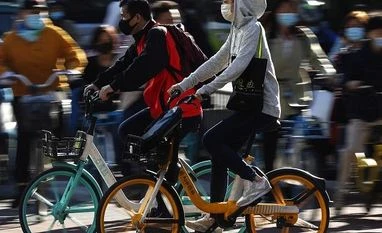China's birth rate has dropped to a record low, with experts questioning Beijing's "one-child" policy, enforced with an iron hand, which is being blamed for the population conundrum visible in a rapidly ageing population and a shrinking workforce.
China's working-age population is fast declining. The number of people too old to work, comparatively, is rising. This will severely impact the country's ability to care for its elderly population.
Furthermore, this could all lead to labour shortages, hampered economic growth, and reduced tax revenue, and could even deepen China's economic growth concerns, reported Inside Over, a news portal.
"For the Chinese history, 2021 will go down as the year when China last saw population growth in a long time," said Wang Feng, a sociology professor at the University of California.
Now the Chinese government is leaving no stone unturned to encourage more births and its tune has completely changed. Now it is offering common incentives, including cash handouts, and real estate subsidies, but many Chinese women are not convinced to take long maternity leaves from their workplaces.
They say this will make their candidature for work in companies weak as establishments may not want to give their employees so many leaves.
Also Read
In 2021, 267 million people were aged 60 and above in China as compared to 264 million in 2020. On the other hand, as per some demographers, the working-age population might fall to half by 2050.
Zhiwei Zhang, the chief economist at Pinpoint Asset management, said, "The demographic challenge is well known but the speed of population ageing is clearly faster than expected. This suggests China's total population may have reached its peak in 2021. It also indicates China's potential growth is likely slowing faster than expected."
China implemented the "one-child policy" from 1980 to 2015 harshly with a view to limit population growth and conserve resources. The government was faced with a challenge when the working-age population, after peaking at 925 million, started dropping sharply.
Following this sharp downfall of the workforce, the Chinese government relaxed the policy, allowing couples to have three children, reported Inside Over. To further combat the issue, China, the country now facing an acute workforce shortage, is offering incentives to people.
As per the National Bureau of Statistics data, the birth rate in China dropped to a record low of 7.52 per 1,000 people in 2021 and 8.52 per 1000 people in 2020. As the working population shrinks in China, the Chinese government has ramped up its efforts to encourage people to have more children.
In 2021, the number of births was just about enough to outnumber the 10.1 million deaths. Compared with 12 million in 2020, only 10.62 million births were reported in 2021. The population grew by a meagre 480,000 to rise to 1.4 billion.
In fact, the natural growth rate fell to 0.034%, lesser than even in 1961 when the economic policy by the Communist Party's supreme leader and Chairman Mao Zedong had led to widespread famine and tens of millions of starvation deaths took place, reported Inside Over.
The birth rate was the lowest since 1949 when Communist China was founded and the statistics bureau began collecting the data.
(Only the headline and picture of this report may have been reworked by the Business Standard staff; the rest of the content is auto-generated from a syndicated feed.)
)